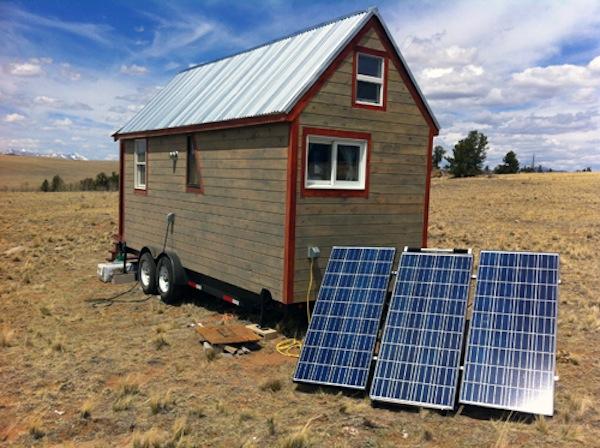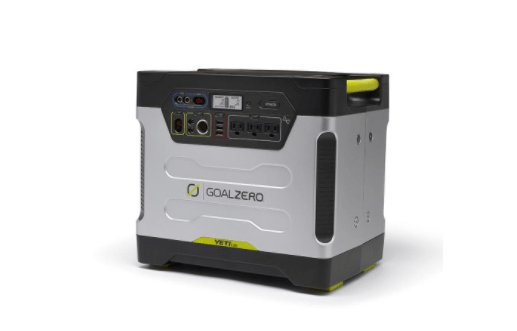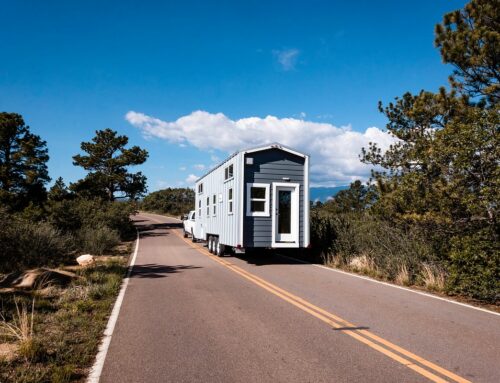A SolMan Classic Portable Solar Generator powers a Tiny Home. Photo courtesy of SolSolutions.
How will you power your Tiny House RV? The easiest way is to connect directly to the grid, but that’s not possible in every parking situation. What if you’d like to camp in the desert, a national park, or deep in the forest? Or perhaps you’ve purchased a piece of land that has not been (or can not be) connected to city power. In these cases, you’ll need to generate your own electricity with an off-grid power source.
I have traveled over 25,000 miles with my Tiny House RV. When it comes to parking, flexibility is key! That’s why I designed my tiny to be off-grid. For this article, I’ll be discussing two types of off-grid power generators: gas and solar.
Gas Generators
The most common type of off-grid generator is the gas powered generator. I’m sure you’ve encountered one of these at some point in your life. As long as you have access to gas, these generators can provide ample electricity to power your Tiny House RV. The downside? Noise and fuel expense.
Several companies produce gas powered generators of varying power generating capabilities. A few popular brands include: Honda, Yamaha and Dometic. Let’s review the specs of the popular Honda EU 2000i gas generator.
Specs for Honda EU 2000i:
Cost: $949. Keep in mind this does not include the cost of gas or a battery system.
Weight: 46 lbs.
Power Capacity: 1600 watts
Run Time: 9.6 Hours On 1 Gallon Of Fuel. The built in inverter in this unit will auto adjust the engine speed to the optimum level depending on load, making this gas generator very efficient.
Other Details: Some campgrounds do not allow or limit the use of gas generators due to noise.
Solar Generators
Solar generators charge an internal battery using solar panels. I use Goal Zero’s Yeti 1250 Solar Generator for electricity when I’m off-grid. This system can power almost everything in my tiny abode, aside from my hair dryer and my space heater. When off-grid I tend to use my wood stove for heat and I skip drying my hair (yes, some sacrifices are made for energy efficiency).
Specs for Goal Zero Yeti 1250 Solar Generator:
Cost: $1999 for the kit, including generator and two 30 watt solar panels. I have two 90 watt solar panels in my system, which was a little more expensive. The Yeti 1250 has a 240w charging maximum.
Weight: 116 lbs.
Power Capacity: 1250 watts
Run time: As long as you have sun, this generator can continue to recharge itself. I’ve lasted a week using this system and being careful about my energy usage. Without sun, the battery will drain relatively quickly depending on your power usage. Check out the table at the bottom of this webpage for reference.
Other Details: No noise, no fumes, no gasoline, no wasted power.
*Another solar generator to watch out for is the GRENGINE. Advertising at the same price as the Yeti 1250, this solar generator weighs only 24 lbs.










I install solar electric systems for a living & none of my customers have any of the equipment you mention. Normal PV systems have larger panels, up to 300 watts, permanently mounted on the roof. It is better however to have them mobile as you do so they can be moved into where the sun is just in case the house faces the wrong direction. The solar panels go to a controller that keeps the batteries from overcharging & discharging back thru the panels at night. Deep cycle 6 volt batteries last years longer than 12 volt batteries and an inverter changes the solar & battery DC power to almost standard 120 volt AC power. Get a pure sinewave inverter instead of a modified sinewave as these can burn up battery chargers like phone and computer chargers but especially power tool chargers like cordless drills.
Thank you.
Hi Chuck:
I have just built a small cabin for recreational use in the woods and currently using 1 Honda 2000 or a 2nd one in parallel for more power but would really like to have a solar option for when we don’t want to have any noise. We are running all LED lighting. We do have a refrigerator and a few electrical appliances but it is not necessary that that the system power these. Would love to here your thoughts. The systems in this article pay a heavy price for their portability. I don’t need that at this time. Thx. Tom.
Thanks for the tip about 6v batteries lasting longer. I would have bought 12v or maybe even 24v deep cycle batteries.
Forget gas generators. BTU output is less than propane and the exhaust is deadly. Gas cannot be found in a power outage and it cannot be stored very long even with the use of drying agents as the ethanol attracts water. A propane generator is safer, gives you more energy and is easy to find a store. If you already have a gas generator, it can be quickly converted to Tri-Fuels (gasoline. propane and natural gas) if you can use basic hand tools (US Carburetion – http://uscarburetion.com/ – 1-800-553-5608). For solar, Chuck is right on. Keep on trucking and enjoy the USA.
I’ve designed several off-grid solar systems for tiny homes. OutBack Power makes some terrific FXR inverters that can be configured for how they will be using them. If you have access to the grid, you can use it to top off the batteries when needed. If not, just use solar and supplement with a generator if needed. There are many solar charge controllers that have displays on them to monitor your system and ensure the batteries are correctly charged. You can often fit around 3 solar panels on your roof, depending on the design, so that can give you up to 900W of solar. You’re not going to run electric heat with that, but it will be plenty for most of your needs.
A lot of RVs also use propane generators. unfortunately I don’t see any mention to this in the article. Propane generators are typically a little more expensive but have the added benefit of using a common fuel we use for stoves and fridges as well. Also they are MUCH quieter than there gas counterparts and are typically more efficient and burn much cleaner.
How about the insulation , I live in canada it gets sometimes minus 30 with blowing blizzard conditions , is there spray foam insulation? Because it don’t think normal insulation would work out to well and the hoses for water how would you keep this from freezing? I’ve been looking at tiny houses for a few years now , but not sure how it would do in extreme cold , thanks Andrea
Regarding Canadian winter conditions check out the website of the carpenter and blogger Ana White. She builds tiny houses together with her husband adapted to severe winter conditions. Lene
Whattaya do with the poop that meets sanitary standards?
Just put in large propane storage for our new place in the woods, while the truck did have a little trouble (we are a new site), so we are bringing in more stone for ease of delivery in this new drive. The propane generator is almost unheard (I did build sound wall, because I thought we would hear it), standing next to it I touch it to see if it is on. The 1000 gallons will keep us up and running, and if we move it for a short trip we can use the 20 pound tanks for the tiny home (just making sure we have shore power as we travel).
Our plan is for it to sit out on that land for the rest of my lifetime and maybe that of my Son’s. It replaced the place I shared with my Grandfather, Father, Uncles, and Cousins (As the family has died or moved away), it is just the two of us now. The fishing and hunting are great! The getting away from the city is great as well, and no one knows we are there fro the most part. Nearest neighbor is almost two miles as the crow flies. We will install gun range in spring closer to new site as we cannot get the tiny house over the creek by the old cabin.
I like both of the comments and am thinking of having solar on my roof, both sides, on portable panels to increase the charging. I like the idea of using a propane generator for the times of no sun and along with that I want to put up a portable wind generator also. I like the idea of the 6v batteries but I am thinking of using 24v aquion energy batteries. I will have the added advantage of being about to take the batteries down to 0% instead of 50% like lead acid Batts. I also do not have to worry about the acid or discharge from the batts charging since these batteries are saltwater batteries. These batteries can be discharged to 0% and recharged 3000 times which is over 8 years and if only taken to 50% then charged will last over 16 years.
This article forgot to mention using both solar and wind in combination. Some newer winder chargers are almost silent in operation and can charge at night as well as day. AGM batteries are becoming more popular and have no free acid that needs water added to and have a good shelf life. Even better battery storage is on the way in the near future. Solar wind do not require fuel of any kind, but a small generator should be kept for emergencies. Before you decide on anything study study study on all of it to determine what is best for you.
Great question in regards to insulation. Spray foam is an excellent choice when you need high performance in a tiny space. Heat moves three ways and spray foam addresses all three along with providing an air & moisture barrier. Not to mention added structural strength. This is by using closed cell spray foam. We have products and installers in the US & Canada. http://www.premiumspray.com
I want to build a tiny house, I plan on having solar panels on both sides of the roof any idea how much installation costs should run in Florida?
How about sewer and waist water. Does it need to be hooked to the main sewer system or what?
You can install a great off-grid solar energy system outfit for a tiny cabin. Energy needs are low and power storage wont break the bank.
My son ordered this for me and it has work well so far. I have been able to charge a small inverter.
It’s easy and comfortable to carry and set up, and not heavy at all.
I am looking to hire someone to build (or at least design) me a continuous use portable power station, automatic switching solar/gas combo and battery bank for my RV on remote hunting property. [email protected]
Thank you